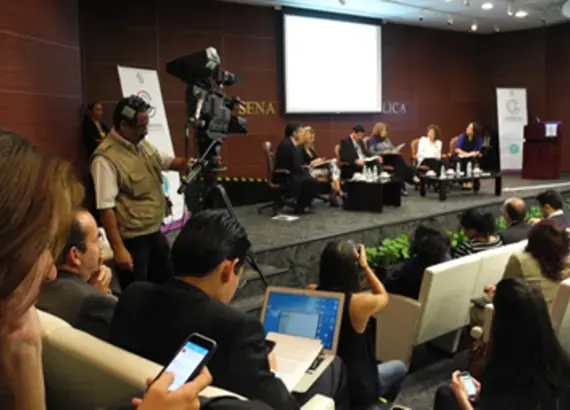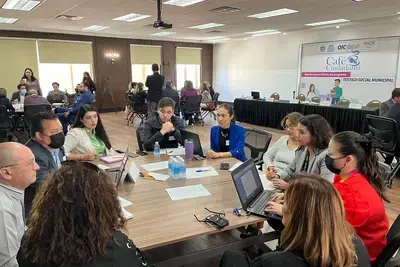
Success Story
Mexican Congress Launches New Initiatives to Increase Legislative Transparency
Although Mexico passed a federal law on transparency and access to public information in 2002, legislative information is still hard to come by for citizens who want to participate in the policymaking process and hold their governments accountable.
According to the Latin American Index of Legislative Transparency, the Mexican Congress often does not release information on attendance, voting records and legislative spending. And when that information is made public, it’s seldom in an open data format. That makes it difficult for citizens and web developers to analyze and share the information with a public that is increasingly interested in monitoring the performance of elected officials.
In an unprecedented effort to address this issue, the Mexican Congress gathered more than 250 people from 24 states—including national and subnational parliamentarians, public officials, civil society representatives, academics, journalists and other interested citizens—in Mexico City in March. In a week-long series of meetings and panels, the legislators discussed steps Congress was taking to increase transparency and involve civil society in the legislative process.
One of these steps included granting autonomy to the Federal Institute for Access to Information and Protection of Data (Instituto Federal de Acceso a la Información y Protección de Datos, IFAI), the body responsible for responding to requests for information, which had previously been organized under the executive branch. Another was requiring all government branches and entities that receive public funds to respond to access to information requests, which totaled 142,000 in 2013, a 7.8 percent increase from 2012.
Legislators also heard from experts about best practices in transparency reform and potential areas for improvement, including greater use of information and communication technologies and publishing information in more accessible formats.
Mexico’s first Transparency and Open Parliament Week was co-organized by Fundar, a local organization advocating for increased transparency in government; Mexican Transparency, Mexico’s chapter of Transparency International; NDI; and the Mexican Senate.
During the event, the Mexican Congress made two landmark announcements. The first was the establishment of a Bicameral Commission on Parliamentary Openness, which demonstrated a commitment by both legislative chambers to work together to provide citizens with information —such as how representatives developed and voted on legislation— to evaluate the performance of their government. In addition, Congress announced the creation of a Partnership for Parliamentary Openness, an alliance between civil society and the Congress to develop goals and plans to increase legislative transparency.
The Mexican government is a member of the Open Government Partnership (OGP), which is a multilateral initiative that aims to secure concrete commitments from governments to promote transparency, empower citizens, fight corruption, and harness new technologies to strengthen governance, and this initiative comes as the Mexican Congress begins to engage as a leading member of the OGP’s Legislative Openness Working Group, the OGP’s wing that advocates for transparency in legislatures.
In addition to the panel discussions, some 130 of the attendees participated in roundtable discussions facilitated by NDI on how to increase transparency and citizen participation in the legislative process. In the discussions, participants developed proposals on how the Congress could increase the public’s involvement in policy-making. These included streaming congressional committee hearings live on the Internet, expanding use of social media accounts to all state congresses to communicate with constituents and raise awareness of legislative affairs, improving the national congress’ website and convening forums with legislators and their constituents. They also recommended developing standards for the presentation of information by federal and local congresses to make it more easily accessible, usable and readable.
Senator Arely Gómez González, chair of the Committee on the Guarantee of Access and Transparency of Information (COGATI), who led the organization of the event, said that the Congress should not only ensure its own transparency, but should also work with civil society to educate citizens on the importance of transparent governments.
The role of technology was recognized as an increasingly critical tool for creating transparency. Alejandra Lagunes, coordinator of the Mexican president’s national digital strategy, said the legislature should increase its use of social media to provide additional outlets for citizens to communicate with their representatives. She also stressed that social media could be as a more innovative and efficient way to provide people with information about their government by sharing it with a wider audience.
Keila González, director of NDI-Mexico, noted the limited Internet penetration in the country and low technological literacy, suggesting it was still important to provide information through traditional means, such as print media, radio and television, to ensure transparency.
NDI, with support from the National Endowment for Democracy, began working with COGATI, other Senate committees and civil society organizations in mid-2013 to increase legislative transparency and access to information. Through the program, NDI and partner organization Fundar developed a tool based on the Declaration on Parliamentary Openness to help legislative committees assess their transparency practices and how they could improve. And with NDI support, COGATI is considering developing guidelines for the online publication of Senate information that could help committees develop transparency standards.
NDI will continue to work with legislators to improve their understanding of and commitment to transparency as well as support civil society’s efforts to increase accountability of their elected representatives in Mexico.
To view photos, presentations, panelist profiles and a detailed agenda of Transparency Week (in Spanish), please visit transparenciayparlamentoabierto.senado.gob.mx/.
Read more:
Published June 17, 2014



